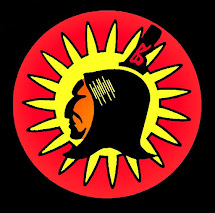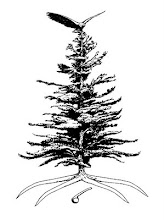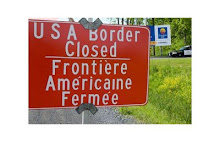Monday, June 9, 2014
The Land of the Free and the Home of the Brave (Oh yeah, Americans and Canadians live there, too)
"Like the miner's canary, the Indian marks the shift
from fresh air to poison gas in our political atmosphere; and our treatment of
Indians, even more than our treatment of other minorities, reflects the rise
and fall in our democratic faith." — Felix S. Cohen, 1953
There is little
question that what the white man found when he washed up on our shores was a
free and fearless people. But rather than learn our ways and study how a people
could live without kings, queens, courts and prisons or slavery, discrimination
and class warfare; the church — the very thing that created many of these institutions
and practices — was relied upon to spread all of this to a free world.
The Doctrine of
Christian Discovery, which has plenty of foundation in the Bible, got its first
shot as a stand-alone church doctrine with Portugal's invasion of West Africa
in the mid-15th century. A pope's decree that a Christian nation
could claim the lands and possessions of a pagan people and reduce them to "perpetual
servitude" would begin four centuries of the African slave trade. In 1493,
another pope would lay the foundation for all "Christian nations" to
begin the rape of our own Turtle Island and secure the racist Doctrine of
Christian Discovery as the law of the white man. In fact, it would be called the
"White Man's Burden."
Certainly, bits and
pieces of our cultures, philosophies and traditions were borrowed when the need
to shift colonial powers and authority would arise. But what was woven into the
American fabric was only done so in rhetoric and not in practice. Laws of
Nature, all created equal, governance by consent of the governed, inalienable rights
to life, liberty and the pursuit of happiness; these not only sounded good,
they were good. These along with the concept that individuals would be placed
in the service of their people rather than as lords over them were, in fact,
the way of our people, a way that allowed our people to thrive for thousands of
years.
"The most consistent theme in the
descriptions penned about the New World was amazement at the Indians’ personal
liberty, in particular their freedom from rulers and from social classes based
on ownership of property. For the first time the French and the British became
aware of the possibility of living in social harmony and prosperity without the
rule of a king." — Jack Weatherford, Indian
Givers: How the Indians of the Americas Changed the World, 1988.
As the fake American history crumbles with
more access to truth and our abilities to tell our own truths, many have begun
to learn about the atrocities of the 500 years of the American Holocaust. And
while acknowledgement of the wrongs and perhaps some attempts to right them is
a good place to start, what's missed in all this is Felix Cohen’s warning.
One thing about Cohen's analogy of us to the miner's canary
was that it was not about saving the canary. It was about saving the miners. It is the
white man with his "burden" and all that Cohen was warning of. It is
more than just an analogy to suggest that the atrocities committed against our
people paved the way for the poison gases of Auschwitz and those now affecting
climate change. Raping our children and our women are crimes against humanity
but raping our Mother Earth is a crime against Creation. And it's not just all
of man that will be affected but all of creation. But let's be honest, most of
Creation will not care less about toppled buildings, crumbled roads and flooded
homes. Only man — with his attempt to defy nature — is in real trouble when
nature strikes back.
Cohen realized that in our people — the
treatment of and relationships with us — lay a barometer for mankind. The fall
in the white man's "democratic faith" was based on an ignorant
majority that could see its way to unspeakable crimes against the people
closest to Creation and never realize that what kills the canary also kills the
miner.
But, in reality, we are still free. It is
the white man that fell to Christendom, with emphasis on the "dom" or
domination. We have lost an inconceivable number of our people over five
centuries to extermination, removal, assimilation and termination. We are still
losing loved ones to poverty, alcohol, drugs and suicide. And we continue to
lose many to assimilation, including those finding comfort in the colonial
systems that continue to oppress our people. But we are not all lost.
There are many among us that continue to say the Ohenton Karihwatehkwen.
We acknowledge our relationship to Creation and bow to no man. We know we are
free because our minds are free. We are not the caged canaries of the white man.
We are a free people. And while many bound within the colonial systems poke
those of our people, who were willing or succumbed to be their canaries, with
their sticks, and begin to question their own fate, more and more will look to
the free and the brave and desire to be among us. They'll pray that we are not
those "merciless savages" Thomas Jefferson wrote about and that we
still hold certain truths to be self-evident — even if they could not.
Subscribe to:
Post Comments (Atom)














![-[]-[]-/\-[]-[]-](https://blogger.googleusercontent.com/img/b/R29vZ2xl/AVvXsEjLoXmKO8PJVQ5pZ2q7GX7nFKw8H2tb28dxt-o10FUBNtOGszWhWoLB7tgjtMgtISpuSxNW3fcDxfuSS2DqojsdjNJ1lVggyUS374PnzsDbOhk4ukvtTunFQcyfkckZeBzcLbri4LDYN_E/s214/29-03-A-voice-from-the-Akw-.jpg)





No comments:
Post a Comment